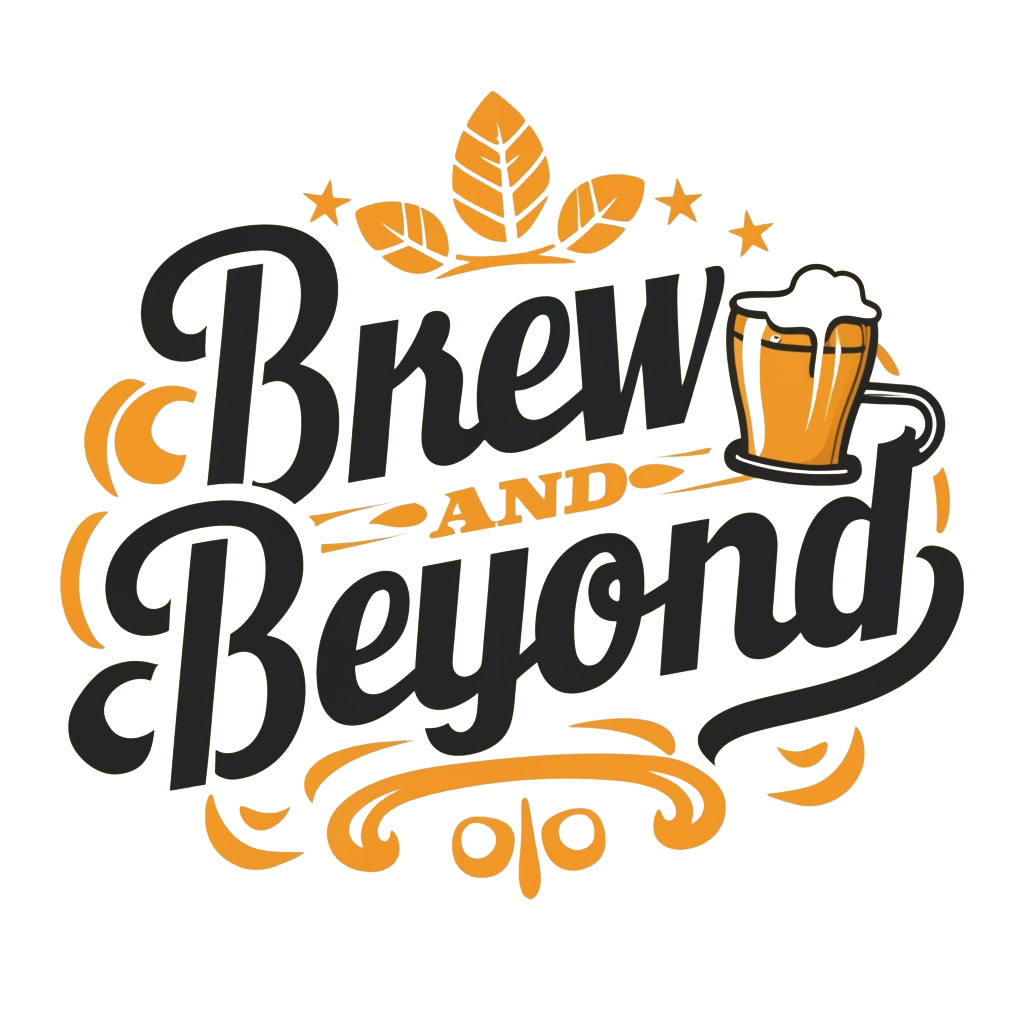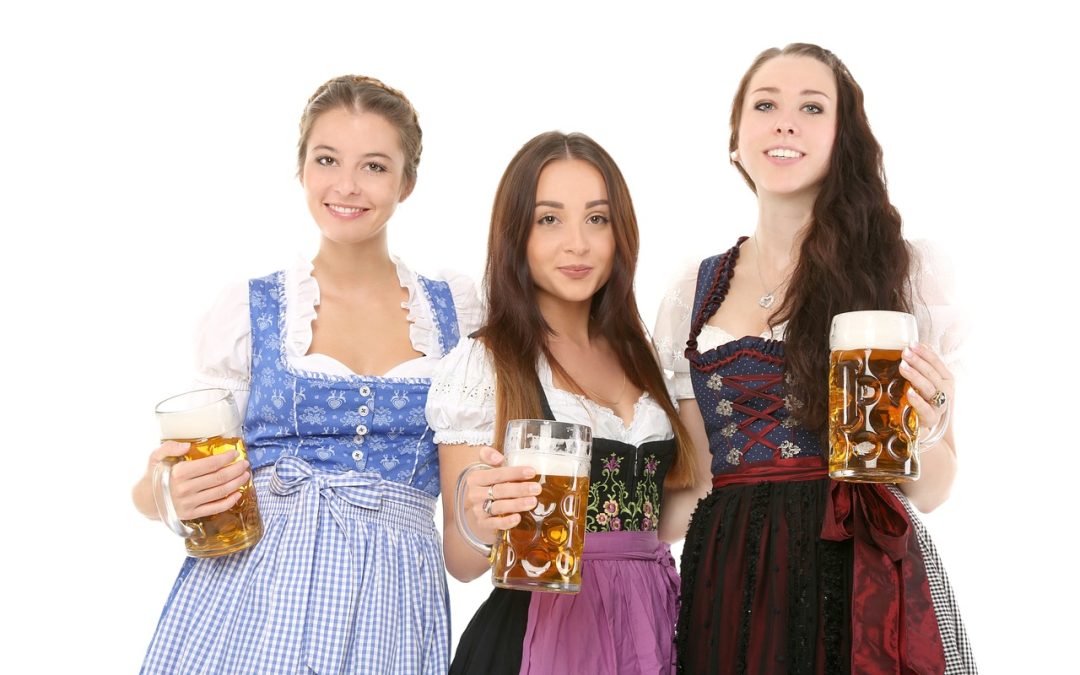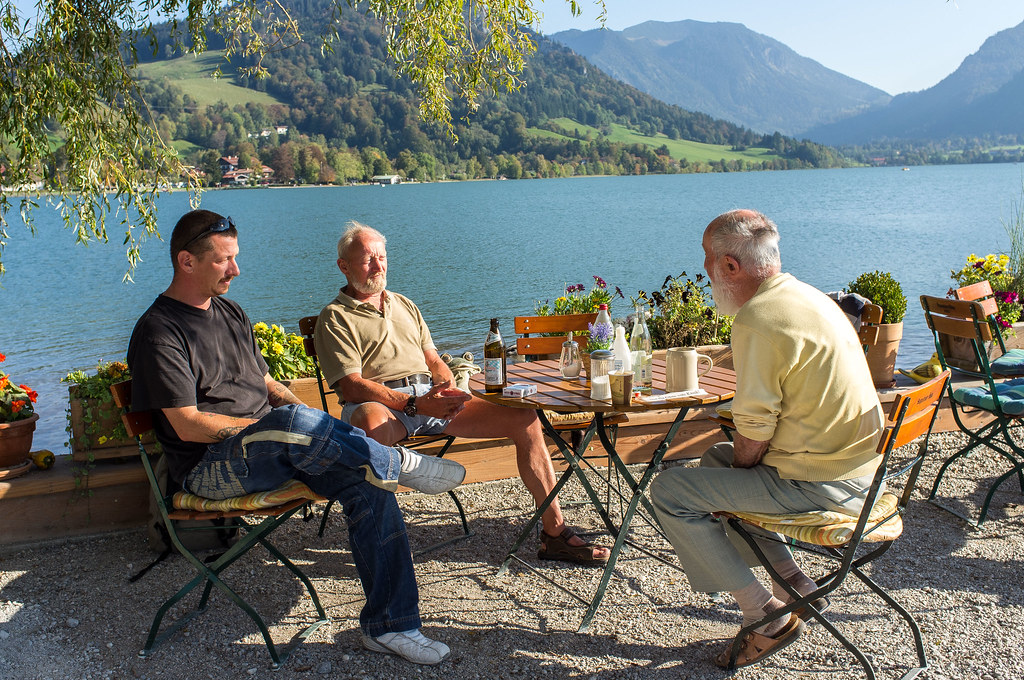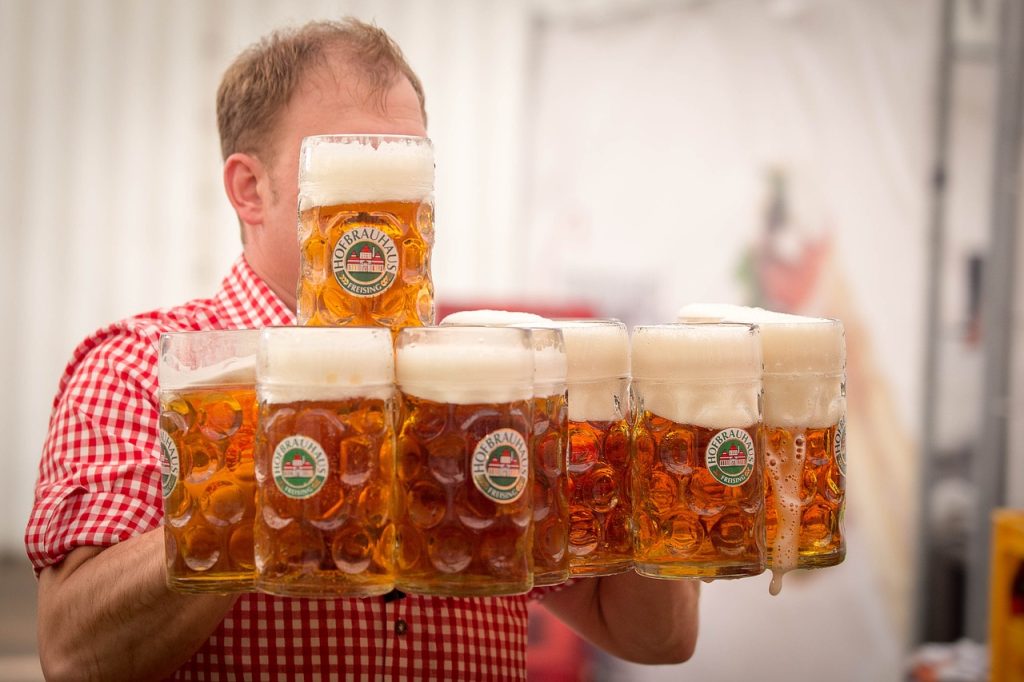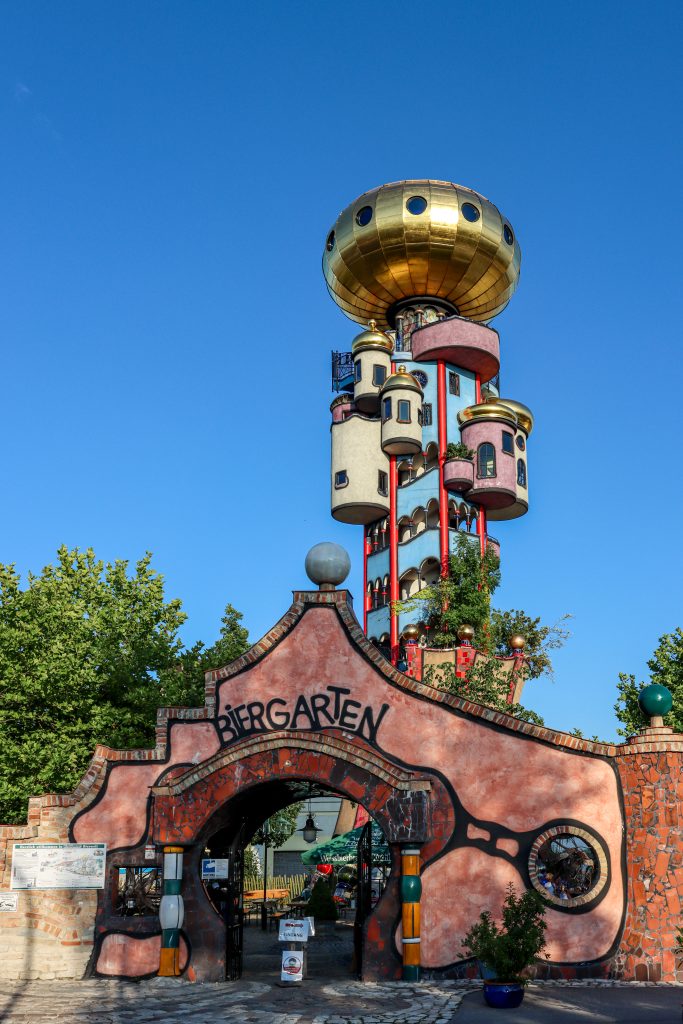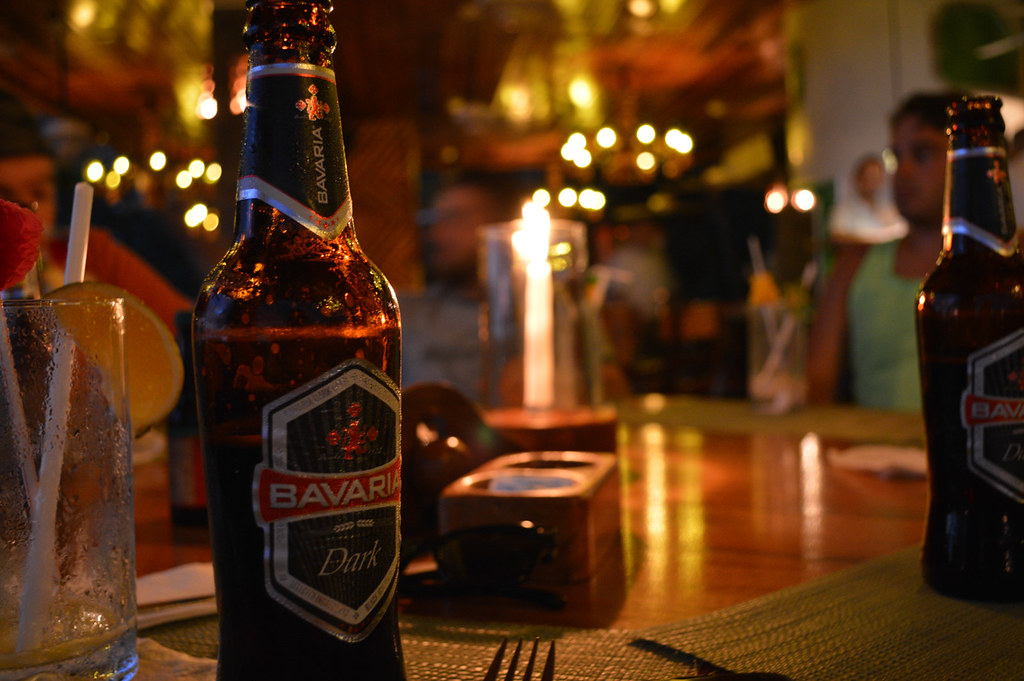As you stroll through the picturesque landscapes of Bavaria, Germany, the scent of freshly brewed beer fills the air, tantalizing your senses and beckoning you to embark on a delightful journey. In this article, we invite you to immerse yourself in the rich and vibrant culture of Bavarian beer. From the renowned Oktoberfest to centuries-old breweries, we will explore the traditions, flavors, and history behind the beloved beers of Bavaria. So grab a pint, sit back, and let us transport you to the heartland of German beer.
The History of German Beer
Germany has a rich and storied history when it comes to beer. From ancient origins to the famous Bavarian beer festivals, the country has long been known for its exceptional brews. So grab a beer, sit back, and let’s take a journey through the history of German beer.
Ancient Origins of German Beer
The history of German beer can be traced back thousands of years to ancient civilizations. The ancient Babylonians, Egyptians, and Greeks all had their own versions of fermented barley beverages. In Germany, beer brewing can be dated back to around 800 BC, when the Celts first began producing their own beer.
The Reinheitsgebot
One of the most significant events in the history of German beer is the implementation of the Reinheitsgebot, also known as the German Beer Purity Law. This law, enacted in 1516, specified that beer could only be brewed with barley, hops, and water. Yeast wasn’t included in the original law, as its role in fermentation wasn’t yet fully understood. The Reinheitsgebot was created to protect consumers from unscrupulous brewers and to maintain the quality of German beer.
Beer in Bavaria
Bavaria, a region in southern Germany, has played a pivotal role in the history of German beer. The area has a deep brewing tradition dating back to the Middle Ages. Monastic breweries were common in Bavaria, with monks brewing beer within the monasteries. These breweries were often the economic centers of their communities and played a crucial role in supporting the local population.
Bavarian Beer Styles
When it comes to German beer styles, Bavaria offers a plethora of options. From refreshing wheat beers to full-bodied lagers, there’s something for every beer lover. Let’s dive into some of the iconic Bavarian beer styles.
Weissbier
Weissbier, also known as wheat beer, is a classic Bavarian beer style. It is brewed with a significant portion of malted wheat, giving it a distinctively light and refreshing character. Weissbier is a top-fermented beer known for its cloudy appearance and fruity esters. It is often enjoyed with a slice of lemon or orange to enhance the citrusy flavors.
Hefeweizen
Hefeweizen is a type of Weissbier that specifically refers to an unfiltered, cloudy wheat beer. It is characterized by its refreshing and balanced flavors, with notes of banana, clove, and bubblegum. Hefeweizen is best enjoyed on a warm summer day, served in a tall glass with a garnish of fresh lemon or orange.
Dunkel
Dunkel, meaning “dark” in German, is a traditional Bavarian lager with a rich and malty flavor profile. It is brewed using roasted malts, giving the beer its deep amber to dark brown color. Dunkel boasts a smooth and slightly sweet taste, with hints of caramel and chocolate. This style pairs well with hearty Bavarian cuisine and is best enjoyed in a traditional beer stein.
Helles
Helles, which translates to “bright” or “pale,” is a light and crisp lager that originated in Munich. It is known for its golden color and delicate maltiness. Helles has a clean and well-balanced flavor profile, with subtle bready notes and a mild hop bitterness. This style is a popular choice among beer enthusiasts year-round.
Bock
Bock is a strong and full-bodied beer style that originated in the town of Einbeck, which is now part of Bavaria. Bocks are characterized by their high alcohol content and rich malt flavors. The beer is often brewed with a combination of pale and dark malts, resulting in a range of flavors from caramel and toffee to roasted nuts and dried fruits. Bock beers are typically enjoyed during the colder months due to their warming qualities.
Rauchbier
Rauchbier, which means “smoke beer” in German, is a unique Bavarian beer style with a distinct smoky flavor. It is made by using malt dried over an open flame, which imparts a smoky aroma and taste to the beer. Rauchbier is often associated with the town of Bamberg, where it originated. This style is an acquired taste but is beloved by many for its bold and complex flavors.
Pilsner
Pilsner is a pale lager that originated in the Czech Republic but has become immensely popular in Bavaria. Pilsners are known for their light golden color, crisp hop bitterness, and clean taste. The beer is traditionally brewed using Saaz hops, which impart floral and spicy notes. Pilsners are a refreshing choice, perfect for quenching your thirst on a hot summer day.
Kellerbier
Kellerbier, meaning “cellar beer” in German, is an unfiltered and unpasteurized lager. It is often served directly from the brewery’s cellar, resulting in a fresh and vibrant flavor profile. Kellerbier is typically characterized by its hazy appearance, bready malt flavors, and mild hop bitterness. This style offers a glimpse into the traditional brewing methods of Bavaria.
Export
Export beer is a classic Bavarian beer style that gained popularity during the 19th century. It is a stronger and more flavorful version of a traditional lager. Export beers are often well-balanced, with a notable malt sweetness and a touch of hop bitterness. This style is known for its smooth and drinkable character, making it a favorite among beer enthusiasts.
Traditional Bavarian Beer Halls
No visit to Bavaria would be complete without experiencing the vibrant atmosphere of a traditional beer hall. These iconic establishments have been serving beer for centuries and are an essential part of Bavarian culture. Let’s explore some of the best beer halls in Bavaria.
Hofbräuhaus
The Hofbräuhaus in Munich is perhaps the most famous beer hall in the world. With its long history dating back to 1589, it has become a symbol of Bavarian beer culture. The Hofbräuhaus offers a lively atmosphere, traditional Bavarian cuisine, and, of course, their renowned Hofbräu beer. It’s a must-visit for anyone looking to immerse themselves in the Bavarian beer experience.
Augustinerkeller
Located in the heart of Munich, the Augustinerkeller is a beloved beer garden and beer hall. It has a charming outdoor seating area surrounded by chestnut trees, creating a cozy and inviting ambiance. The Augustinerkeller serves a variety of Augustiner beers, brewed in one of Munich’s last independent breweries. Visitors can enjoy traditional Bavarian dishes while listening to live music and soaking in the vibrant atmosphere.
Andechser am Dom
Located near the famous Frauenkirche in Munich, Andechser am Dom is a beer hall and restaurant that offers a taste of Bavarian hospitality. With its warm and rustic interior, it provides a cozy setting to enjoy a range of Andechser beers. The brewery, located in the Andechs Monastery, has been brewing beer since 1455. Andechser am Dom offers a diverse menu of Bavarian specialties, making it a great place to immerse yourself in Bavarian culinary traditions.
Weihenstephaner
The Weihenstephan brewery, located in the town of Freising near Munich, is the oldest continuously operating brewery in the world. Weihenstephaner beer hall and garden offer an authentic Bavarian experience. Visitors can enjoy a wide range of Weihenstephaner beers while taking in the picturesque views of the Alps. The beer hall also offers a menu of traditional Bavarian dishes, perfect for pairing with their exceptional brews.
Löwenbräukeller
The Löwenbräukeller is a historic beer hall and restaurant located in Munich. With its spacious interior and traditional design, it provides a welcoming and festive atmosphere. The Löwenbräukeller is known for its Löwenbräu beer, brewed according to the highest Bavarian brewing standards. Visitors can enjoy classic Bavarian dishes while surrounded by the lively energy of the beer hall.
Bavarian Beer Festivals
Bavaria is famous for its vibrant beer festivals, drawing beer enthusiasts from around the world. These festivals celebrate the rich brewing traditions of the region and offer an unforgettable experience. Let’s explore some of the most famous Bavarian beer festivals.
Oktoberfest
Arguably the most famous beer festival in the world, Oktoberfest takes place in Munich and attracts millions of visitors each year. This 16-day festival celebrates Bavarian beer culture with a vast selection of beers from the local breweries. Visitors can enjoy traditional music, delicious food, and the jovial atmosphere of the festival. Oktoberfest is a must-visit for anyone looking to experience the true essence of Bavarian beer culture.
Starkbierzeit
Starkbierzeit, which translates to “strong beer season,” is a beer festival held in spring in Munich. This festival originated in the 17th century and celebrates the stronger and maltier beers of Bavaria. Visitors can enjoy a wide range of strong beers, including the famous Salvator beer, brewed by Paulaner. Starkbierzeit offers a unique and festive experience, with music, dancing, and hearty Bavarian cuisine.
Volksfest
Volksfest, meaning “people’s festival,” is celebrated throughout Bavaria in various towns and cities. These festivals offer a more localized and intimate experience compared to Oktoberfest. Volksfest features traditional beer tents, amusement rides, live music, and a vibrant carnival atmosphere. Visitors can sample a variety of local beers and enjoy the friendly camaraderie that defines Bavarian beer festivals.
Brauereienfest
Brauereienfest, translated as “brewery festival,” is a celebration of local breweries held in many towns and villages across Bavaria. This festival shines a spotlight on the small, family-owned breweries that are an integral part of Bavarian beer culture. Visitors can taste a wide range of beers directly from the breweries, often accompanied by live music, cultural performances, and local food specialties. Brauereienfest offers an intimate and authentic experience for beer enthusiasts.
The Brewing Process in Bavaria
To truly appreciate Bavarian beer, it’s essential to understand the brewing process. Bavaria has a long and storied tradition of brewing, with centuries-old techniques still being used by many breweries today. Let’s explore the brewing process in Bavaria.
Malting and Mashing
The brewing process begins with malting, where grains such as barley are soaked in water and allowed to germinate. The germination process activates enzymes that break down complex starches into fermentable sugars. Once the grains have germinated, they are dried and crushed to create malt. During mashing, the malt is mixed with hot water, allowing the enzymes to convert the starches into sugars. This process creates the sweet liquid known as wort.
Boiling and Hop Addition
After mashing, the wort is transferred to a boil kettle, where it is heated to a rolling boil. During this stage, hops are added to the boiling wort. Hops contribute bitterness, aroma, and flavor to the beer. Bavarian brewers often use noble hops, known for their delicate and spicy characteristics. The length of the boiling process and the timing of hop additions can vary depending on the desired beer style.
Fermentation and Maturation
Once the boiling process is complete, the wort is rapidly cooled and transferred to a fermentation vessel. The cooled wort is then inoculated with brewer’s yeast, which initiates fermentation. This process converts the sugars in the wort into alcohol and carbon dioxide. Fermentation can take anywhere from a few days to several weeks, depending on the beer style and desired flavor profile.
After fermentation, the beer undergoes maturation or conditioning. This stage allows the beer to develop its flavors and clarity. In Bavaria, lagers are typically fermented at cooler temperatures and undergo longer maturation periods. This process helps create a smooth and clean-tasting beer.
Filtration and Carbonation
Once the beer has reached its desired flavor and clarity, it undergoes filtration to remove any remaining solids or yeast. Filtration helps create a clear and visually appealing beer. After filtration, carbonation is added to the beer. In traditional Bavarian breweries, carbonation is often achieved naturally through a secondary fermentation process. This produces a finer, softer carbonation compared to force carbonation methods.
Bavarian Beer Gardens
Bavarian beer gardens are an integral part of the beer culture in Bavaria. These outdoor spaces offer a unique and relaxed atmosphere to enjoy a refreshing beer. Let’s explore some of the best beer gardens in Bavaria.
Schloss Nymphenburg
In Munich, there are two beer gardens located close to the breathtaking Nymphenburg Palace grounds. These beer gardens, one called Taxisgarten and the other called Die FASANERIE, are located close to the Schloss Nymphenburg and provide a lovely atmosphere. While strolling through the palace gardens and taking in the stunning Baroque architecture, guests can sip beer. In addition to serving a selection of Bavarian beers, these beer gardens also sell regional fare like sausages and pretzels. It’s a lovely place to unwind and take in Bavaria’s splendor.
Chinese Tower
The Chinese Tower beer garden in Munich is known for its vibrant and lively atmosphere. It derives its name from the Chinese-style pagoda structure located at the center of the beer garden. With its large outdoor seating area and live music, it attracts locals and tourists alike. The beer garden serves a range of Bavarian beers, as well as a diverse selection of food options. The Chinese Tower beer garden is a fantastic place to enjoy a beer and experience the energetic spirit of Munich.
Viktualienmarkt
Viktualienmarkt, located in the heart of Munich, is not just a bustling food market; it is also home to a charming beer garden. The beer garden offers a cozy and inviting space amidst the vibrant market atmosphere. Visitors can sample a variety of Bavarian beers and savor traditional dishes made with fresh ingredients from the market. Viktualienmarkt beer garden is a great place to combine sightseeing and beer tasting in Munich.
Breweries to Visit in Bavaria
Bavaria is home to numerous breweries, each with its own unique history and beer offerings. For beer enthusiasts, visiting these breweries provides an opportunity to witness firsthand the traditions and craftsmanship behind Bavarian beer. Let’s explore some breweries worth visiting in Bavaria.
Ayinger Brewery
Founded in 1877, Ayinger Brewery is located in the picturesque village of Aying, just outside of Munich. This family-owned brewery combines traditional brewing techniques with modern innovations to produce award-winning beers. Visitors to Ayinger Brewery can take a guided tour to learn about the brewing process and sample a variety of their exceptional beers. From their signature Ayinger Celebrator Doppelbock to their refreshing Ayinger Bräuweisse, there’s something for everyone to enjoy.
Weihenstephan Brewery
As mentioned earlier, the Weihenstephan Brewery in Freising holds the title of the oldest continuously operating brewery in the world. Its rich brewing heritage dates back to 768 when the Weihenstephan Abbey began brewing beer. A visit to the Weihenstephan Brewery is like stepping back in time, with its historic buildings and traditional brewing methods. The brewery offers guided tours that delve into the history and brewing techniques of this renowned institution. Visitors can sample a range of Weihenstephan beers, including their world-renowned Hefeweizen and Helles.
Andechs Monastery Brewery
Nestled in the Bavarian countryside near the town of Andechs, the Andechs Monastery Brewery offers a tranquil setting for beer enthusiasts. Brewing beer since 1455, the Monastery Brewery is renowned for its traditional brewing methods and commitment to quality. Visitors can take a guided tour of the brewery and learn about the brewing process while exploring the beautiful monastery grounds. A visit to Andechs wouldn’t be complete without sampling their famous Andechser Doppelbock Dunkel or their refreshing Andechser Weissbier Hell.
Paulaner Brewery
Paulaner Brewery, founded in Munich in 1634, has a long and storied history. Originally brewed by the Paulaner monks, the brewery carries on the traditions and recipes that have been passed down through generations. A visit to the Paulaner Brewery provides insight into the brewing process and the opportunity to experience their range of beers. From their iconic Paulaner Hefe-Weißbier Naturtrüb to their full-bodied Paulaner Salvator, there’s a beer to suit every taste at this historic brewery.
Franziskaner Brewery
The Franziskaner Brewery can trace its roots back to 1363 when the Franciscan Friars started brewing in Munich. Today, the brewery continues to produce exceptional wheat beers that uphold Bavaria’s tradition of quality brewing. A visit to the Franziskaner Brewery offers the chance to see the brewing process in action and taste their renowned beers. From their refreshing Franziskaner Hefe-Weissbier to their rich and full-bodied Franziskaner Dunkel, beer enthusiasts will find plenty to enjoy at this historic brewery.
Beer Culture in Bavaria
Beer is deeply ingrained in Bavarian culture, shaping traditions, social customs, and even religious practices. Let’s explore some aspects of beer culture in Bavaria.
Beer Drinking Traditions
Bavarians have a rich tradition of beer drinking, often involving unique customs and rituals. One such tradition is the “Prost.” When toasting in Bavaria, it is customary to make eye contact with each person at the table and clink glasses while saying “Prost” or “Zum Wohl,” meaning “cheers” or “to your health.” This tradition is a way of showing respect and creating a sense of camaraderie.
Bavarians also embrace the concept of Gemütlichkeit, which loosely translates to “coziness” or “conviviality.” It refers to the relaxed and welcoming atmosphere often found in beer gardens and beer halls. Sharing a beer with friends or strangers, engaging in friendly conversation, and enjoying the moment are all fundamental aspects of beer culture in Bavaria.
Beer Tasting and Pairing
As beer culture in Bavaria moves beyond customary drinking practices, beer tasting and pairing are growing in popularity. Beer aficionados can explore the distinct flavors and fragrances of various beer styles by partaking in beer tastings. These tastings often involve sampling a range of beers and discussing their characteristics with experts.
Pairing beer with food is another aspect of beer culture in Bavaria. Bavarian cuisine offers a wide range of hearty dishes that complement the flavors of the local beers. From traditional sausages and pretzels to rich stews and roasted meats, there’s a beer to enhance every meal. Beer dinners and pairing events are organized to showcase the harmonious relationship between Bavarian food and beer.
Bavarian Beer Stein Tradition
Bavarian beer steins, with their intricate designs and historical significance, are an iconic symbol of Bavarian beer culture. These decorative beer mugs often feature ornate pewter lids and engravings that depict scenes from Bavaria’s history and culture. Beer steins were originally used to keep insects out of the beer, especially during outdoor drinking sessions. Today, they are treasured collectibles and are often passed down through generations.
Beer and Religion
Beer has a fascinating connection with religion in Bavaria. Many monastic breweries, such as the Andechs Monastery Brewery and Weihenstephan Brewery, were established by religious orders. The brewing tradition started within monasteries as a way to sustain the community and fulfill their religious obligations. Beer produced by these monastic breweries often carries the name or the emblem of the religious order, emphasizing the deep-rooted connection between beer and religion in Bavaria.
Iconic Beer Brands from Bavaria
Bavaria is home to some of the most iconic and well-known beer brands in the world. These breweries have built a reputation for their quality, craftsmanship, and adherence to Bavarian brewing traditions. Let’s explore a few of the most iconic beer brands from Bavaria.
Hofbräu
Hofbräu is synonymous with Bavarian beer culture. With its long history and association with the Oktoberfest, Hofbräu is undoubtedly one of the most recognizable beer brands from Bavaria. The brewery’s flagship beer, Hofbräu Original, is a classic Bavarian lager with a crisp and slightly bitter flavor. Hofbräu beers are known for their exceptional quality and are enjoyed by beer lovers both in Bavaria and around the world.
Paulaner
Paulaner is another iconic beer brand from Bavaria, known for its traditional brewing methods and wide range of exceptional beers. The brewery’s Hefe-Weißbier Naturtrüb is especially popular, with its classic wheat beer flavor and refreshing character. Paulaner beers are brewed according to the Reinheitsgebot, ensuring a pure and high-quality product. Whether you’re enjoying a Paulaner at Oktoberfest or in the comfort of your own home, you’re experiencing the essence of Bavarian beer.
Weihenstephan
As we mentioned earlier, the Weihenstephan Brewery holds the title of the oldest continuously operating brewery in the world. It has become a symbol of Bavarian brewing excellence and tradition. Weihenstephan beers are crafted with meticulous attention to detail, resulting in authentic and classic Bavarian flavors. From their flagship Hefeweizen to their rich and malty Vitus, every beer from Weihenstephan is a testament to the brewery’s centuries of experience.
Franziskaner
Franziskaner is known for its exceptional wheat beers, brewed with the same dedication and expertise that has been passed down through generations. Their Weissbier and Dunkel varieties are beloved for their smooth and rich flavors. Franziskaner beers have become synonymous with Bavarian tradition and quality, delighting beer enthusiasts around the world with their authentic taste and character.
Ayinger
Ayinger beers are brewed in the small village of Aying, just outside of Munich. In this tranquil setting, the family-owned brewery creates beers that exemplify Bavarian brewing traditions. Ayinger Celebrator Doppelbock, with its complex maltiness and rich flavors, has garnered international acclaim. Every sip of an Ayinger beer reveals the brewery’s commitment to quality and craftsmanship.
Exploring Bavaria’s Beer Routes
For beer lovers, exploring Bavaria’s beer routes is an excellent way to immerse yourself in the region’s beer culture and heritage. These routes take you through picturesque landscapes, historic breweries, and charming towns. Let’s explore some of Bavaria’s most notable beer routes.
The Altmühltal Beer Route
The Altmühltal Beer Route winds its way through the stunning Altmühltal Nature Park, taking you on a beer-filled journey through the heart of Bavaria. Along the route, you’ll discover traditional breweries, sample unique beer styles, and experience the natural beauty of the region. The Altmühltal Beer Route is a must-visit for those looking to combine beer tasting with outdoor adventures.
The Bierliebhaber’s Dream Trail
The Bierliebhaber’s Dream Trail, translated as the “Beer Lover’s Dream Trail,” is an epic beer journey through Franconia, a region known for its beer diversity. The trail covers approximately 12 breweries and spans around 20 kilometers. Along the way, you’ll visit historic breweries, sample regional beer specialties, and learn about the brewing traditions that have defined Franconian beer culture for centuries.
The Franconian Beer Route
The Franconian Beer Route is a scenic road trip that takes you through the heartland of Franconian brewing. The route is dotted with charming towns, historic breweries, and picturesque landscapes. As you travel along the route, you’ll have the opportunity to taste Franconia’s famous Kellerbier, visit traditional brewpubs, and learn about the brewing heritage that has shaped this region’s beer culture.
The Upper Palatinate Beer Route
The Upper Palatinate Beer Route, located in northeastern Bavaria, is a beer lover’s paradise. This route showcases some of the region’s most historic breweries, including the iconic Tucher Brewery in Nuremberg. Along the way, you’ll experience the unique flavors of Upper Palatinate beer, visit traditional beer gardens, and explore the charming towns that bring Bavarian beer culture to life.
The King-Ludwig-Way
The King-Ludwig-Way is a scenic hiking trail that takes you through the breathtaking landscapes of Bavaria, from Lake Starnberg to Neuschwanstein Castle. Along this trail, you’ll encounter numerous breweries, beer gardens, and historic beer halls. The King-Ludwig-Way offers a unique opportunity to combine beer tasting with outdoor adventure, allowing you to experience the natural beauty of Bavaria while savoring its exceptional beers.
As you can see, Bavaria is a beer lover’s paradise. From its ancient origins to its vibrant beer festivals and iconic breweries, the region offers a rich and diverse beer culture. So raise your glass, immerse yourself in Bavaria’s beer heartland, and embark on an unforgettable journey through the history, traditions, and flavors that make Bavarian beer so exceptional. Prost!
© 2023 by brewandbeyond.com. All rights reserved. No part of this document may be reproduced or transmitted in any form or by any means, electronic, mechanical, photocopying, recording, or otherwise, without prior written permission of brewandbeyond.com.
